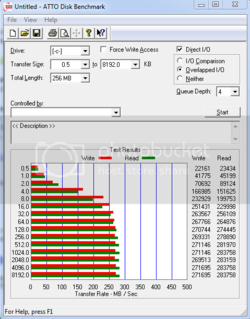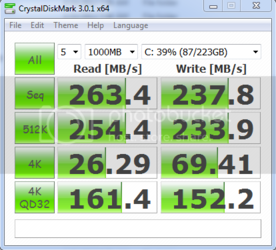- Joined
- Feb 24, 2012
- Location
- Minnesota, USA
Hi All,
I recently purchased and installed a 240GB Corsair Force GT ssd. I have run some benchmarks which seem to show that my ssd speed is capped at about 1/2 the speed Corsair claims it should run (see my benchmark results below). I have set up the drive per Corsair setup instructions and did a fresh install of Windows AFTER changing the storage mode in my BIOS to AHCI and I have the latest F14 BIOS. And, yes, I have all my SSD's and HDD's plugged into the SATA 6.0 Gb/s ports on my motherboard.
My Gigabyte P55-UD4P motherboard uses a Marvell controller and I have read that mobos with the Marvell controller limit the SATA 6.0 Gb/s ports to more like 3.0 Gb/s performance (which seems to dovetail with my benchmarks). Can anyone verify that?
Any other ideas on what to try so I can uncork this blazing fast new SF-2200 series SSD?
Here's my system specs for your reference:
Intel Core i5 750
Gigabyte P55A-UD4P
G Skill Ripjaws 8 GB DDR3-1600
AMD Radeon HD 5850
Corsair Force GT 240 GB Boot Drive
WD Caviar Black 1 TB Storage Drive
Asus 26” VW266 monitor
Corsair TX750 modular PSU
Cooler Master HAF-922 case
Windows 7 Home Premium 64 bit


I recently purchased and installed a 240GB Corsair Force GT ssd. I have run some benchmarks which seem to show that my ssd speed is capped at about 1/2 the speed Corsair claims it should run (see my benchmark results below). I have set up the drive per Corsair setup instructions and did a fresh install of Windows AFTER changing the storage mode in my BIOS to AHCI and I have the latest F14 BIOS. And, yes, I have all my SSD's and HDD's plugged into the SATA 6.0 Gb/s ports on my motherboard.
My Gigabyte P55-UD4P motherboard uses a Marvell controller and I have read that mobos with the Marvell controller limit the SATA 6.0 Gb/s ports to more like 3.0 Gb/s performance (which seems to dovetail with my benchmarks). Can anyone verify that?
Any other ideas on what to try so I can uncork this blazing fast new SF-2200 series SSD?
Here's my system specs for your reference:
Intel Core i5 750
Gigabyte P55A-UD4P
G Skill Ripjaws 8 GB DDR3-1600
AMD Radeon HD 5850
Corsair Force GT 240 GB Boot Drive
WD Caviar Black 1 TB Storage Drive
Asus 26” VW266 monitor
Corsair TX750 modular PSU
Cooler Master HAF-922 case
Windows 7 Home Premium 64 bit


Last edited: